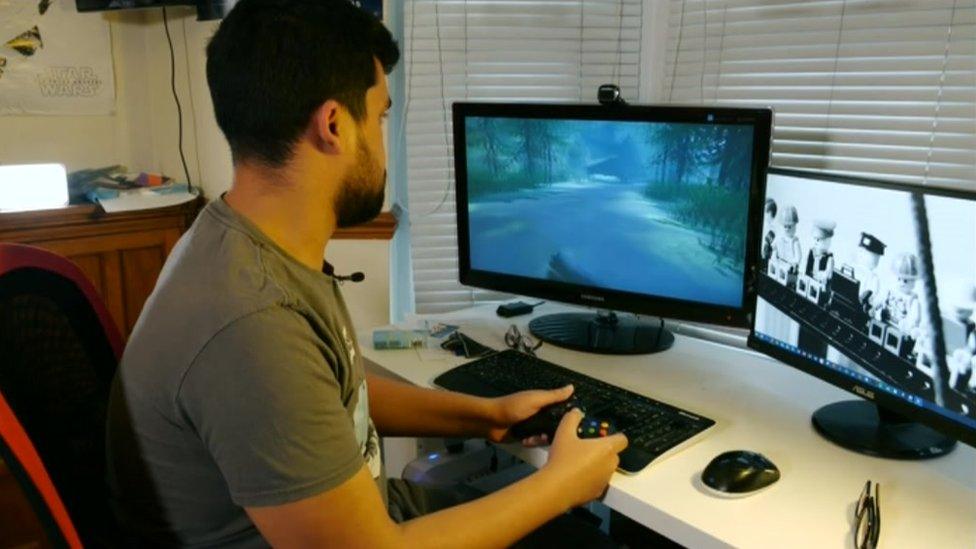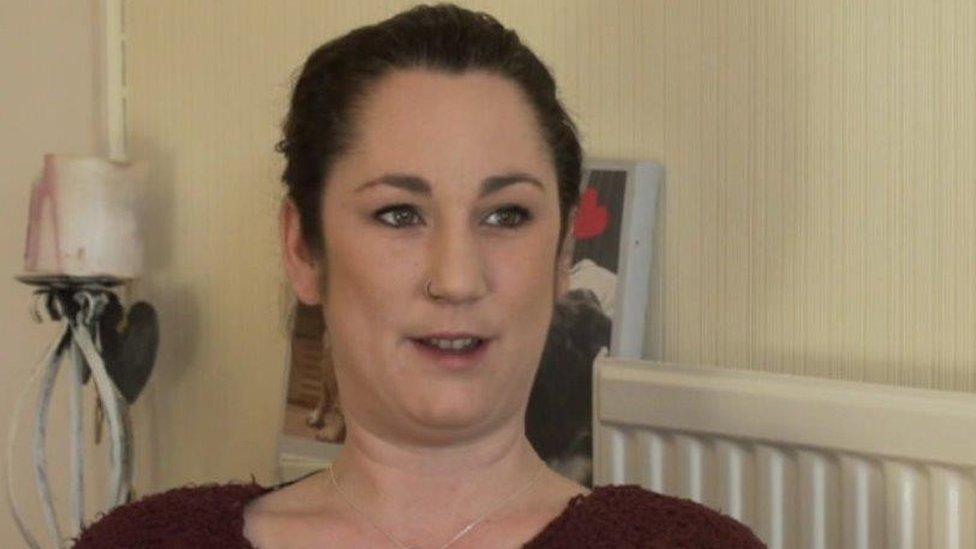Wales mental health patients 'needlessly' placed miles away
- Published
Mental health treatment away from home "not right", says Mair Elliot
Mental health patients are being sent "needlessly" over the border despite available beds in Wales, a charity has said.
Last year about 30% of 1,000 mental health and learning disability patients were placed in hospitals in England.
Hafal said it was unable to fill beds at its unit in Pontardawe outside Swansea.
The Welsh Government said the number was decreasing with only "very specialist centres in England" used.
It added it was the responsibility of health boards to commission appropriate placements.
Hafal's chief executive Alun Thomas said despite the Gellinudd Recovery Centre receiving Welsh Government funding when it opened, it was consistently overlooked by health boards in favour of units as far away as London and Portsmouth.
He said several rooms at the 16-bed centre were still yet to be slept in by a patient, despite it being open for more than two years.
"We have never been more than half full here," he said.
"At present we have 12 empty beds and we are astonished that we can't fill them when we know that places like Cardiff and Vale and Hywel Dda [health boards] have massive, massive bed pressures.
"We understand that there's over £50m to £60m per year being spent by the Welsh NHS on sending patients to England, that's money not being spent on the Welsh economy, that means people then have to travel to see their families."
Mr Thomas said the charity had not been told why it was seeing so few Welsh patients referred to it, but as a consequence was considering taking English NHS patients to make ends meet.
"We're losing between £300,000 and £400,000 per year as a result of empty beds, so you're talking about £7,000 or £8,000 pounds a week, which to a charity is not sustainable."
The Welsh NHS has 87 approved units - 20 of which are in Wales - which health boards can use.

Mental health charity Hafal said it was "unable" to fill beds at Gellinudd Recovery Centre
But Prof Keith Lloyd, chair of the Royal College of Psychiatrists in Wales, said sending patients outside of Wales had become "common practice".
"People with mental health problems should be treated exactly the same as people with physical health problems.
"It's the exception rather than the rule for people to go to other places for treatment with something like cancer.
"If you have something very rare or very unusual than you have to go to a specialist centre but let's be clear, people with mental health problems being sent out of the area, out of the country even, are not people with very rare or unusual conditions.
"They're people we could care for near their families and near their friends."
A Welsh Government spokesperson said: "We are committed to ensuring people can access mental health and learning disabilities services as close to home as possible.
"We continue to have robust arrangements in place to monitor the quality and safety of specialist inpatient settings."
'Very, very scared'
Mair Elliott, 22, was sent more than 200 miles away from her Haverfordwest home to hospital in London when she was 16.
"At the time I was very, very suicidal," she said.
"I was experiencing hallucinations, such as I was hearing voices and seeing characters. These voices and characters would talk to me and tell me to do things such as kill myself. They were very distressing.
"I was 16, incredibly ill and very, very scared. I hadn't really spent time away from my home before and I was carted off five hours down the road to an unknown place for an unknown amount of time, away from my parents.
"It just was not appropriate to put me through that, and to put my parents through that too."
Mair, now a mental health campaigner, said the care in London was "excellent" but the distance took a toll.
"They [my parents] actually ended up spending pretty much all of their savings just coming to see me so they could be a part of my treatment and make sure that I had my family around me."
If you have been affected by the issues raised, there are organisations that can help
- Published22 May 2019

- Published24 February 2019

- Published7 February 2019
